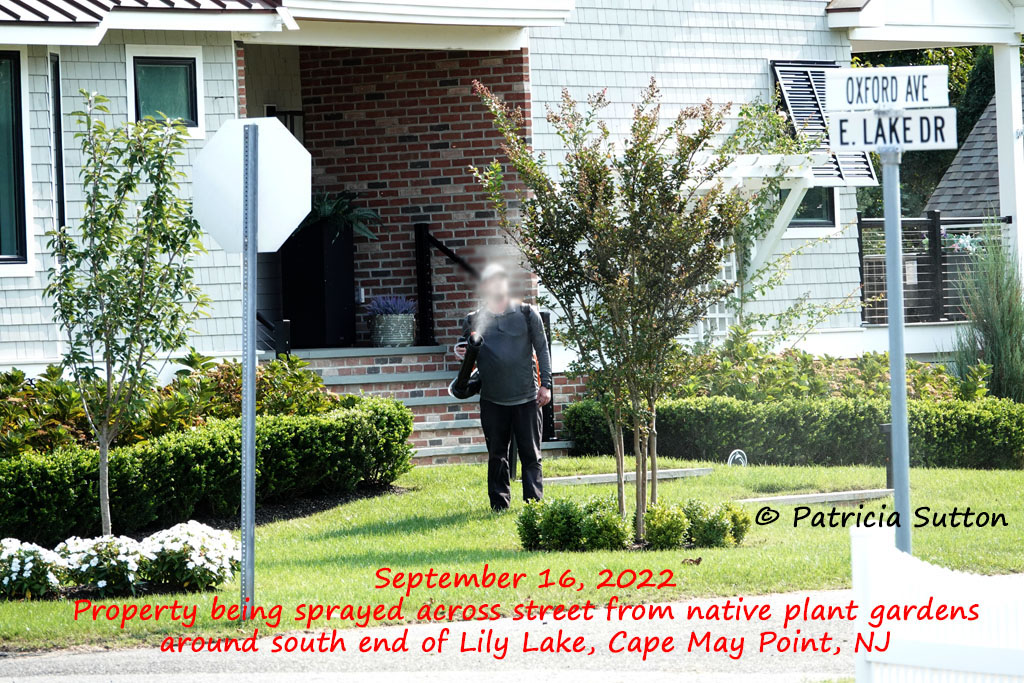 As wildlife garden owners, many of us have encountered a neighbor who fears all bugs, feels one mosquito bite is too many, doesn’t realize that ticks are part of our landscape, and feels that they can solve it all by hiring one of the many private companies that promises to take care of mosquitoes and ticks safely. Such companies even have the jargon down by promoting their approach as “pollinator friendly.” I wish that were the case. For example, Pyrethrins (which are derived from chrysanthemum plants and sold as a ‘natural organic control’) are toxic to many non-target insects, including beneficial pollinators, and are also highly toxic to fish.
As wildlife garden owners, many of us have encountered a neighbor who fears all bugs, feels one mosquito bite is too many, doesn’t realize that ticks are part of our landscape, and feels that they can solve it all by hiring one of the many private companies that promises to take care of mosquitoes and ticks safely. Such companies even have the jargon down by promoting their approach as “pollinator friendly.” I wish that were the case. For example, Pyrethrins (which are derived from chrysanthemum plants and sold as a ‘natural organic control’) are toxic to many non-target insects, including beneficial pollinators, and are also highly toxic to fish.
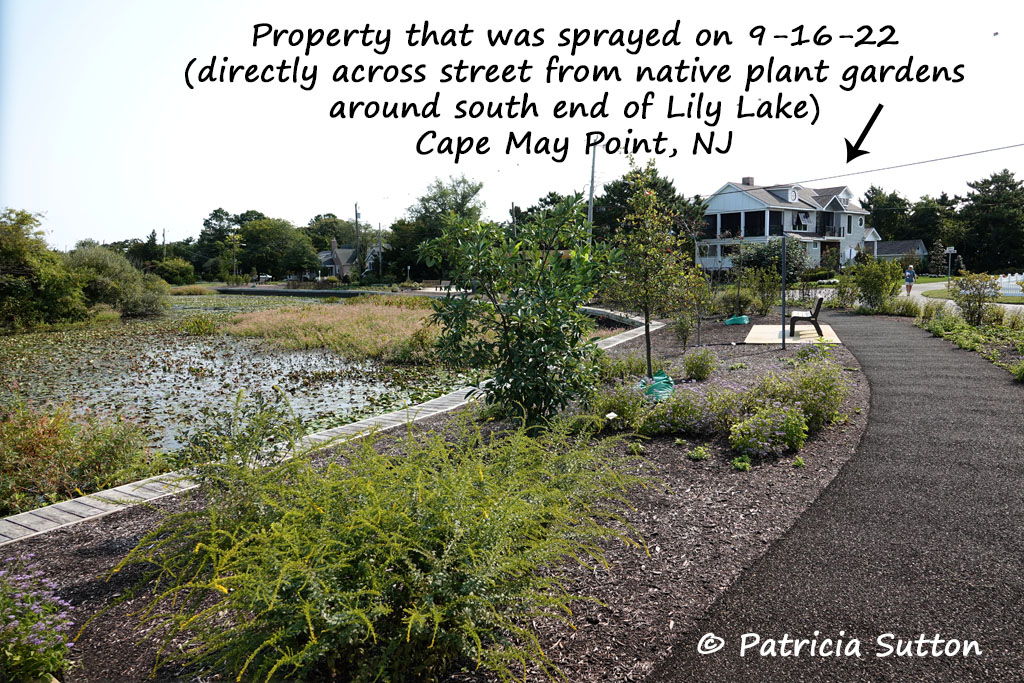 Our wildlife gardens and pollinator habitats of native plants and abundant leaf litter are oases for beneficial pollinators. When a private company sprays the neighbor’s property, that spray can and often does drift onto our rich preserved habitats full of life. This drift spray takes a huge toll on pollinators. Plus, insects do not recognize property lines.
Our wildlife gardens and pollinator habitats of native plants and abundant leaf litter are oases for beneficial pollinators. When a private company sprays the neighbor’s property, that spray can and often does drift onto our rich preserved habitats full of life. This drift spray takes a huge toll on pollinators. Plus, insects do not recognize property lines.
Because our gardens concentrate a super abundance of beneficial pollinators we are obligated to notify any agencies or private companies that do spray for pest insects like mosquitoes and ticks in our neighborhood. Case in point: In 2021, I began leading tours and teaching pollinator programs for the Avalon Environmental Commission in Avalon, NJ’s newly created Pollinator Garden in Armacost Park. That July the Cape May County Department of Mosquito Control sprayed Armacost Park, including the Pollinator Garden. The Department of Mosquito Control’s entomologist was aghast that a pollinator garden had been sprayed (in their defense, they were completely unaware of the garden). Shortly after, with my urging, the Avalon Environmental Commission contacted the Cape May County Department of Mosquito Control and requested that the Pollinator Garden be put on the notification list (NO SPRAY list). For those of you not already on your county’s no spray list, you’ll find full details and contact info towards the end of this post.
I am sharing this Garden Gang Alert because wildlife and pollinator gardeners (and organic gardeners and bee keepers) do have rights as a neighboring “non-target” property when your neighbor signs on with a private company offering mosquito prevention packages, tick prevention packages, or both, with add on options to also treat for “gnats, fleas, stinkbugs and more.” Many of these private companies have packages available where they treat/spray every 3 weeks, with some “added protection!” packages where they spray every 2 weeks. Any treatment is unwelcome to those of us with wildlife gardens and pollinator habitats, but an onslaught of treatments every 2 or 3 weeks could be a death sentence for most of the area’s insects!
Here is HELP if a Private Company is Spraying the Neighbor’s Yard for Mosquitoes
If you live in New Jersey, here is a CHECKLIST to follow if your neighbor has hired a private company (‘Company’) to treat their property for mosquitoes, ticks, etc. and you fear, for good reason, that any spray will drift onto your property and kill the wealth of beneficial pollinators your garden has attracted, concentrated, and is benefiting. I do not know if other states offer a similar option. If your state responds to pesticide drift concerns, please comment in the comment section after my post to share that information with me and others!
-
- Your rights: You have rights not to be drifted upon as a non-target site when a ‘Company’ is hired by a neighbor (the actual rule is: ‘No person applying a pesticide shall permit drift or other movement of the pesticide to infringe on a non-target site, under circumstances where such infringement should be reasonably foreseeable’).
- Call the DEP Hotline, 1-877-WARN-DEP (1-877-927-6337) and report your concerns about pesticide drift onto your property during applications by a ‘Company’ hired by a neighbor.
- Explain to the DEP Hotline (and/or your county’s NJ-DEP Pesticide Control Program inspector, see # 4) that you garden for wildlife (including pollinators) and that your property is a safe harbor for them and concentrates them. List what efforts you have made to provide for beneficial insects (native plants, host plants, wildlife pond, pollinator garden, etc.) and list insects you’ve attracted to your yard.
- Calls to the DEP Hotline (mentioned in #2) such as these are then directed to the NJ-DEP Pesticide Control Program (PCP). You can also call the NJ-DEP PCP directly at (609) 984-6568 and ask to speak with your county’s PCP inspector (each county has an inspector). Ask for your inspector’s email address so that you can cc them when you write to the ‘Company’ hired by your neighbor to treat for mosquitoes, ticks, etc.
- In correspondence to the ‘Company’ copy in your county’s NJ-DEP Pesticide Control Program inspector (this lets the ‘Company’ know that if their spray ‘drifts’ onto your property, they will be held accountable).
- Write to the ‘Company’ stating concerns about their applications in your neighborhood, noting the above points (that you have rights, that your property concentrates beneficial pollinators, etc.), and request that they provide notification one-day in advance of any upcoming treatments, listing date & time, applicator’s name & license #, product Brand name & copy of the label showing both active & inactive ingredients. Be sure to cc your county’s NJ-DEP Pesticide Control Program inspector. (David Donnelly, a Garden Gang member who successfully thwarted a neighbor’s hiring of one such ‘Company’ shared that “the ‘Company’ does not have to provide this at all to any neighboring sites unless they are asked to do so, that is why it is important to copy in the DEP Inspector for proof that you asked. There is no rule stating a time limit of notification either, but he suggests asking for one day notice so you can make yourself available to watch and video the application if necessary.”)
Effects of Mosquito Sprays Used by Private Companies
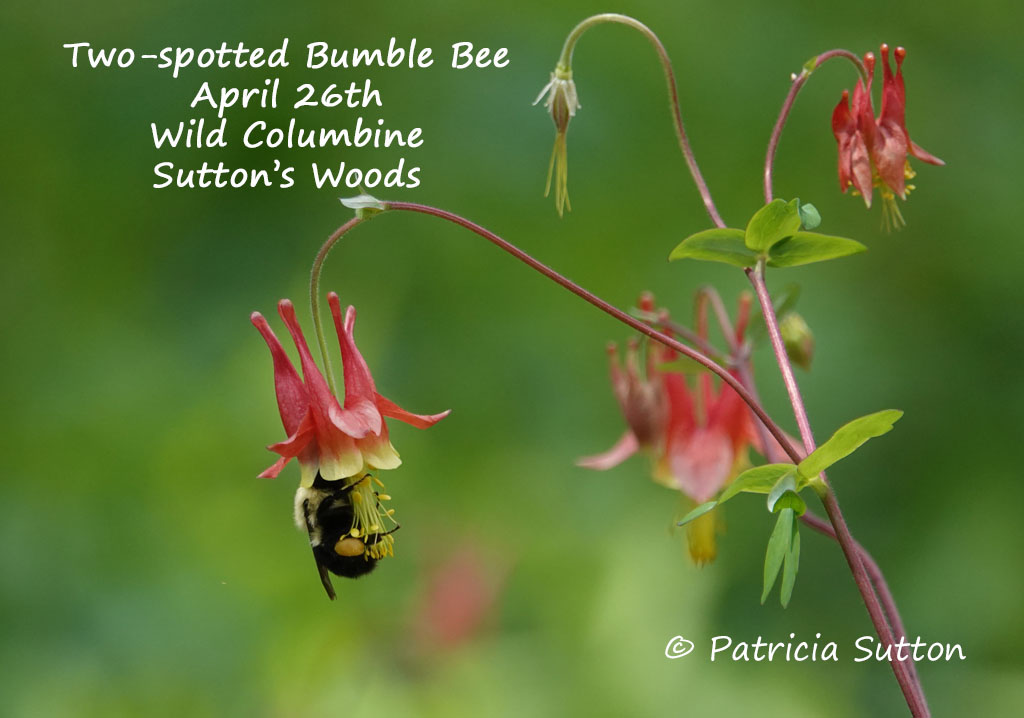 Heather Holm, author of 3 excellent books about native pollinators and their close association with native plants, alerted me to the excellent article by Colin Purrington, “Effects of mosquito sprays on humans, pets, and wildlife,” summarizing the active ingredients of the pesticides used by a number of private companies offering to spray yards and ‘eliminate mosquitoes.’ Click HERE to read Purrington’s article so you fully understand the harm these sprays can have! Purrington shares how the active ingredients of the pesticides used impact pollinator populations: “for example, the spray kills Monarch caterpillars, even weeks later due to the presence of insecticide dried onto milkweed leaves,” “pyrethroids kill fireflies, which are most active in a yard in the late evening when mosquito-spraying franchises like to fog,” and Purrington’s “favorite group of unnoticed insects that are killed by evening pyrethroid applications are solitary bees, of which there are approximately
Heather Holm, author of 3 excellent books about native pollinators and their close association with native plants, alerted me to the excellent article by Colin Purrington, “Effects of mosquito sprays on humans, pets, and wildlife,” summarizing the active ingredients of the pesticides used by a number of private companies offering to spray yards and ‘eliminate mosquitoes.’ Click HERE to read Purrington’s article so you fully understand the harm these sprays can have! Purrington shares how the active ingredients of the pesticides used impact pollinator populations: “for example, the spray kills Monarch caterpillars, even weeks later due to the presence of insecticide dried onto milkweed leaves,” “pyrethroids kill fireflies, which are most active in a yard in the late evening when mosquito-spraying franchises like to fog,” and Purrington’s “favorite group of unnoticed insects that are killed by evening pyrethroid applications are solitary bees, of which there are approximately 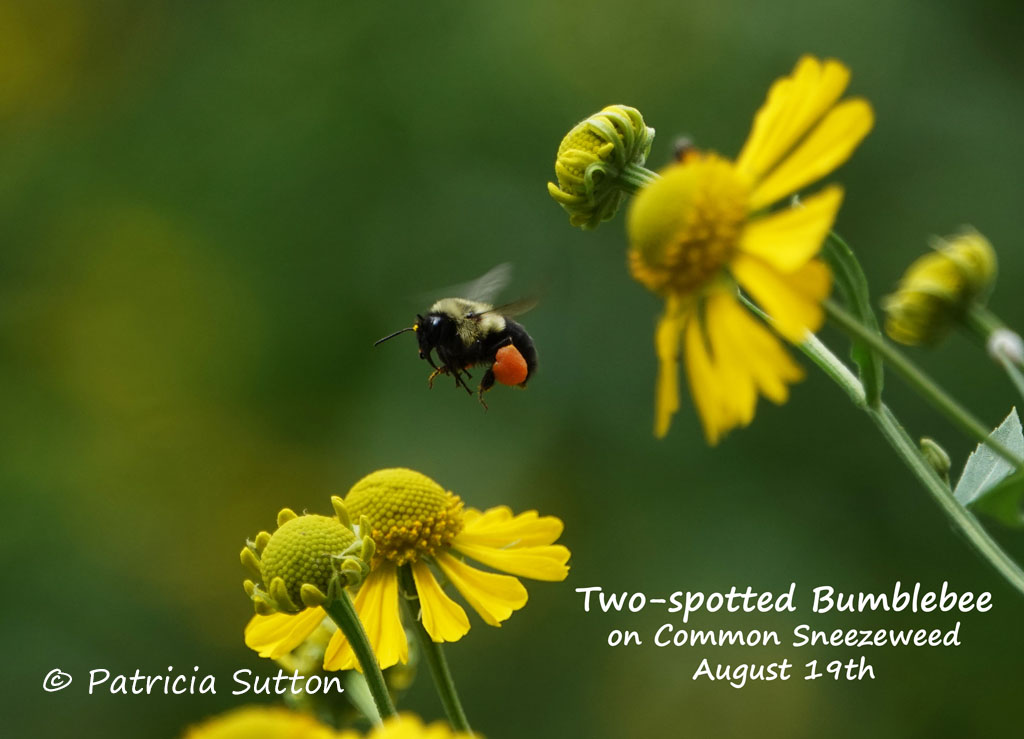 4,000 species in the United States. These are bees that collect pollen and nectar during the day but spend their evenings and nights in holes (e.g., mason bees) or clamped to low vegetation. Everyone has dozens of species of native bees in their yards but few people realize it. So when pesticide applicators claim their pyrethroid sprays ‘don’t harm bees’ or are ‘bee friendly,’ that is entirely untrue.” Heather Holm, Colin Purrington, and I firmly agree that if you want to protect the pollinator populations in your neighborhood, please do not hire a company to spray your yard for mosquitoes!
4,000 species in the United States. These are bees that collect pollen and nectar during the day but spend their evenings and nights in holes (e.g., mason bees) or clamped to low vegetation. Everyone has dozens of species of native bees in their yards but few people realize it. So when pesticide applicators claim their pyrethroid sprays ‘don’t harm bees’ or are ‘bee friendly,’ that is entirely untrue.” Heather Holm, Colin Purrington, and I firmly agree that if you want to protect the pollinator populations in your neighborhood, please do not hire a company to spray your yard for mosquitoes!
Mosquito Education
Regarding mosquito issues in your neighborhood, education is, of course, key. Prevention is the first step. Since mosquitoes need to breed in stagnant water, the most effective form of mosquito control is to remove all open containers, unclogging gutters and adding agitators or wildlife to any remaining water features to stop mosquito larvae from surviving within them. The Cape May County Department of Mosquito Control has a MOSQUITO HABITAT CHECKLIST (click HERE) available to help property owners resolve mosquito breeding sites they themselves may have created. Print this checklist and share it with any neighbors who have signed on for treatments by one of these private companies.
Notification List (NO SPRAY List)
If your municipality is spraying at night by truck, in many cases you can contact your municipality or local government and request to have your property not sprayed. If any of you maintain a wildlife garden, keep bees, or garden organically here in Cape May County, New Jersey, where spraying for mosquitoes occurs, you can call and tell the Cape May County Department of Mosquito Control that you do not want your property sprayed (609-465-9038, Mon.-Fri., 7 am to 3 pm; ask to be put on their “Notification List” / “No Spray List”). Be ready to provide: (1) your name, (2) snail mail address (street address), and (3) e-mail address (so they can notify you when spraying needs to be done in your town). If you have called previously to be put on the “Notification List” (“No Spray List”), you will remain on this list indefinitely, unless you choose to be removed from the list by calling the Cape May County Department of Mosquito Control. (Those of you who live in other counties, where mosquito spraying also occurs, can call your county mosquito department too.)
In 2009 I called and told them that I did not want my property sprayed (a half-acre wildlife garden & habitat full of native plants, birds, pollinators, and other wildlife). Since then I have been on their “NOTIFICATION LIST” (“NO SPRAY LIST”) and they notify me when my town, Goshen, NJ, is going to be sprayed.
The Insect Crisis is Real
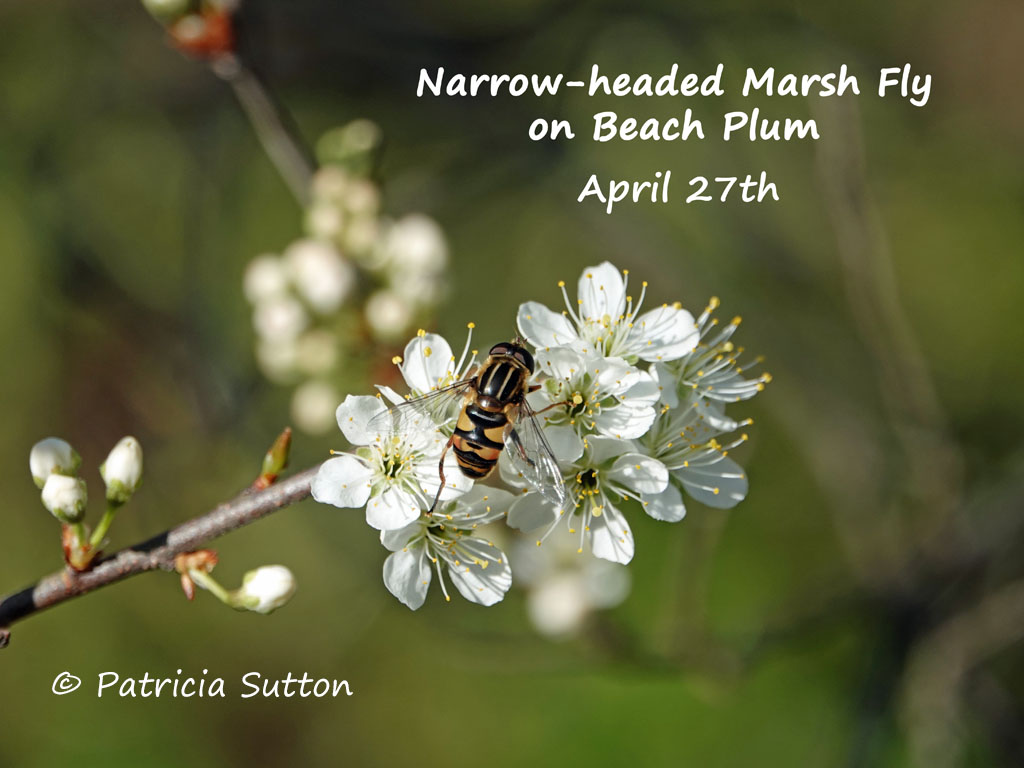 Our wildlife garden is our entire ½ acre property. We’ve learned so much since we purchased the property in 1977, and we’ve corrected some early misguided plantings (Autumn Olive and Butterfly Bush). Today our property harbors hundreds of different native plants. We’ve enjoyed jaw dropping numbers and diversity of butterflies in our garden, tallying 78 different species to date.
Our wildlife garden is our entire ½ acre property. We’ve learned so much since we purchased the property in 1977, and we’ve corrected some early misguided plantings (Autumn Olive and Butterfly Bush). Today our property harbors hundreds of different native plants. We’ve enjoyed jaw dropping numbers and diversity of butterflies in our garden, tallying 78 different species to date. 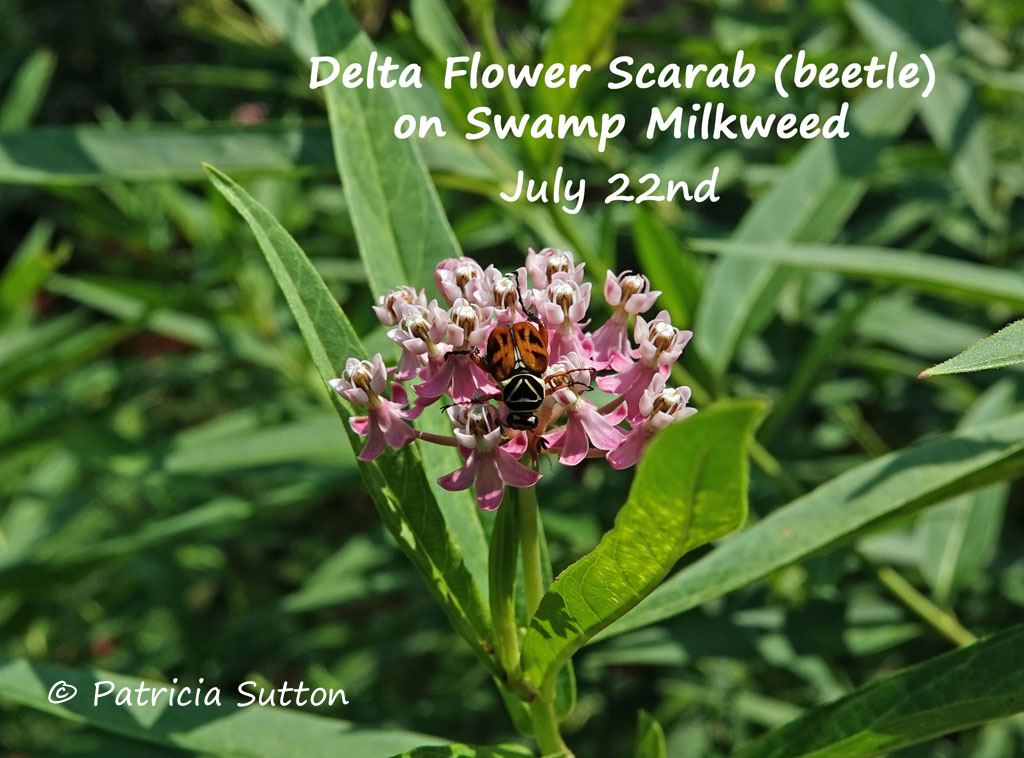 I have turned my eye to other pollinators and, with the help of iNaturalist, I am having great fun identifying a wealth of bees, wasps, flies, beetles, and moths (once on my iNaturalist page, click on “Observations” to see some of them). This direction, looking beyond butterflies, was a necessary step as butterfly numbers declined in my garden for reasons I could not
I have turned my eye to other pollinators and, with the help of iNaturalist, I am having great fun identifying a wealth of bees, wasps, flies, beetles, and moths (once on my iNaturalist page, click on “Observations” to see some of them). This direction, looking beyond butterflies, was a necessary step as butterfly numbers declined in my garden for reasons I could not 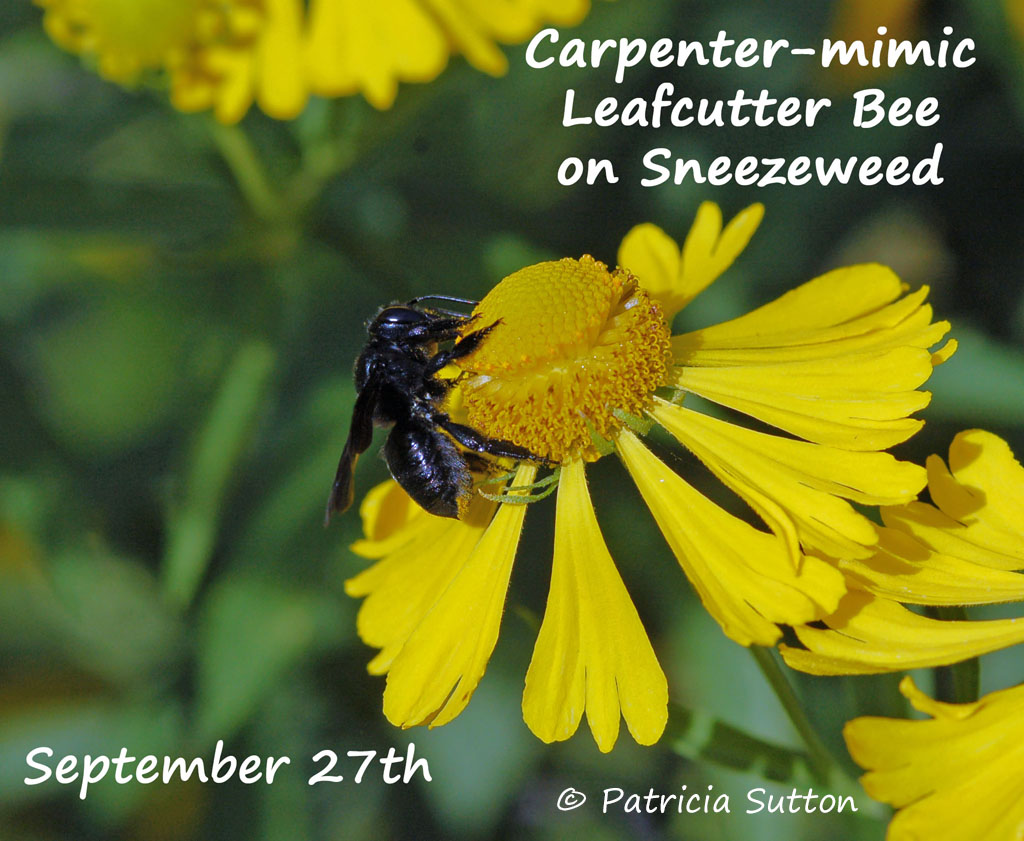 understand . . . , that is, until I read Oliver Milman’s book, The Insect Crisis, The Fall of the Tiny Empires That Run the World (published in 2022). I highly recommend reading this book, but I warn you that it will spiral you into a deep depression! Hence, this garden gang alert!
understand . . . , that is, until I read Oliver Milman’s book, The Insect Crisis, The Fall of the Tiny Empires That Run the World (published in 2022). I highly recommend reading this book, but I warn you that it will spiral you into a deep depression! Hence, this garden gang alert!
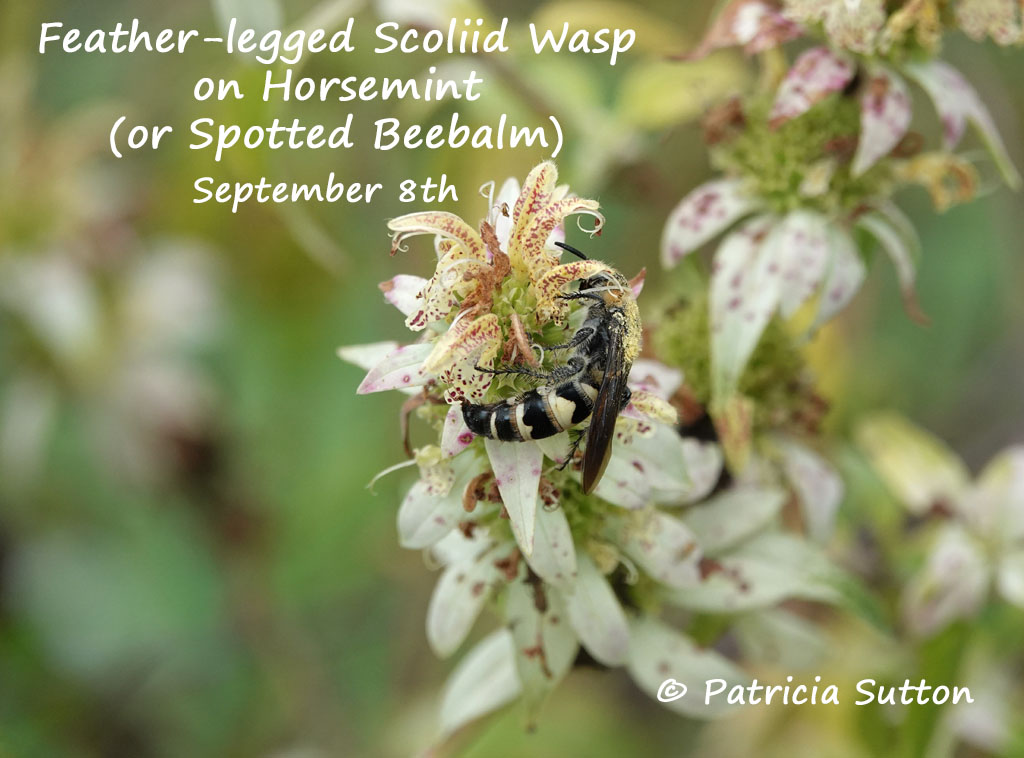 Speak up and make your voice heard; we all work too hard to create safe refuges for pollinators to let them be eliminated so easily and so completely. Stop any spraying that could drift into your refuge of native plants where so many pollinators are concentrated.
Speak up and make your voice heard; we all work too hard to create safe refuges for pollinators to let them be eliminated so easily and so completely. Stop any spraying that could drift into your refuge of native plants where so many pollinators are concentrated.
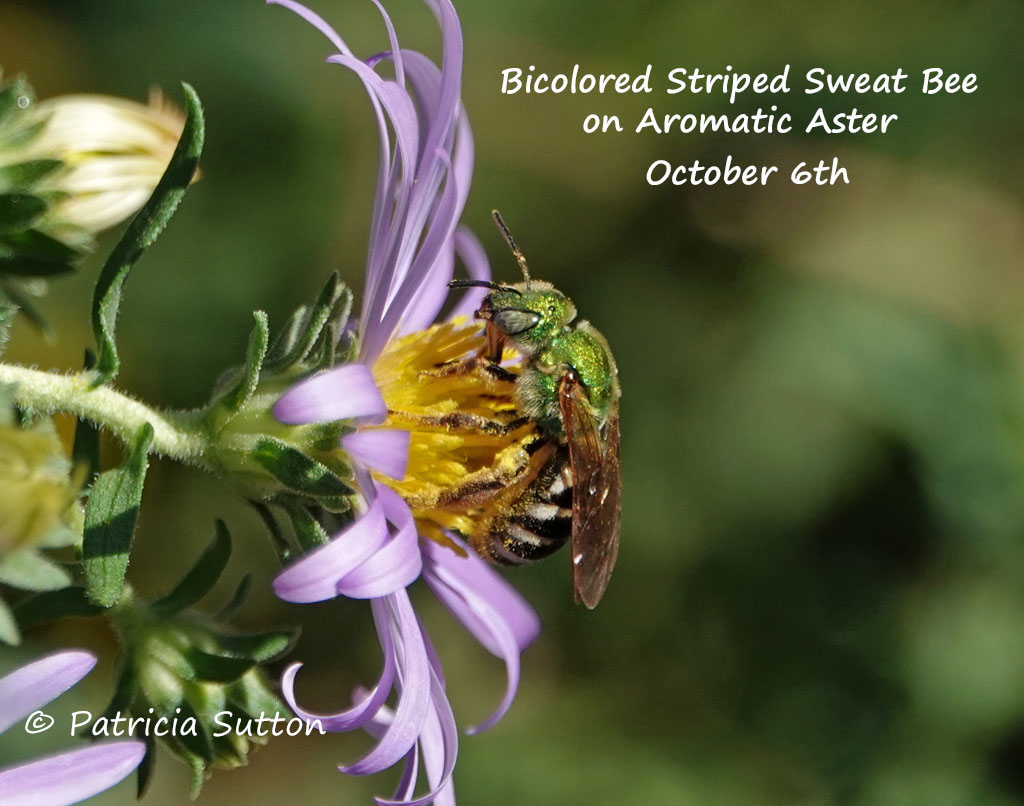 Case in point: The photos that accompany this post were taken in Cape May Point, NJ, famous worldwide for the fall migration of birds and Monarchs. They were taken on September 16, 2022 (at the peak of this migration). The yard being sprayed by a private company is directly across the street from native plant gardens planted by the community around the south end of Lily Lake, including a large bed of Butterfly Weed that was covered in Monarch caterpillars when I took these photos.
Case in point: The photos that accompany this post were taken in Cape May Point, NJ, famous worldwide for the fall migration of birds and Monarchs. They were taken on September 16, 2022 (at the peak of this migration). The yard being sprayed by a private company is directly across the street from native plant gardens planted by the community around the south end of Lily Lake, including a large bed of Butterfly Weed that was covered in Monarch caterpillars when I took these photos.
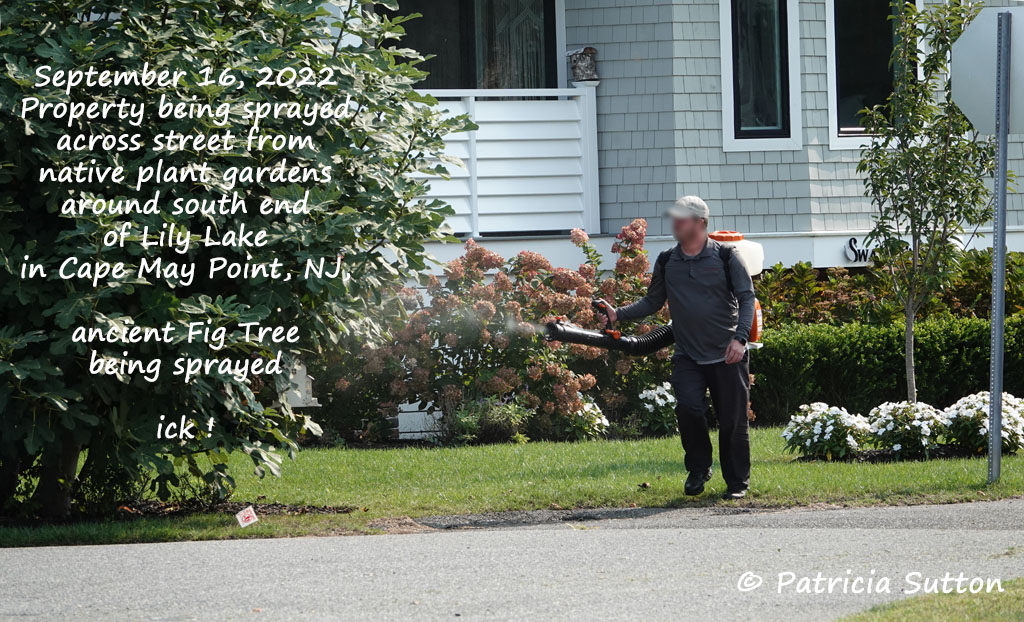 If we (individuals and communities) create pollinator habitats with plantings of native plants, it is our obligation and responsibility to also protect them from incidents like this. Otherwise all we have accomplished is to have created ecological traps where we are dooming the very pollinators we are trying to benefit by concentrating them in potentially hazardous sites.
If we (individuals and communities) create pollinator habitats with plantings of native plants, it is our obligation and responsibility to also protect them from incidents like this. Otherwise all we have accomplished is to have created ecological traps where we are dooming the very pollinators we are trying to benefit by concentrating them in potentially hazardous sites.
Thank you for caring!
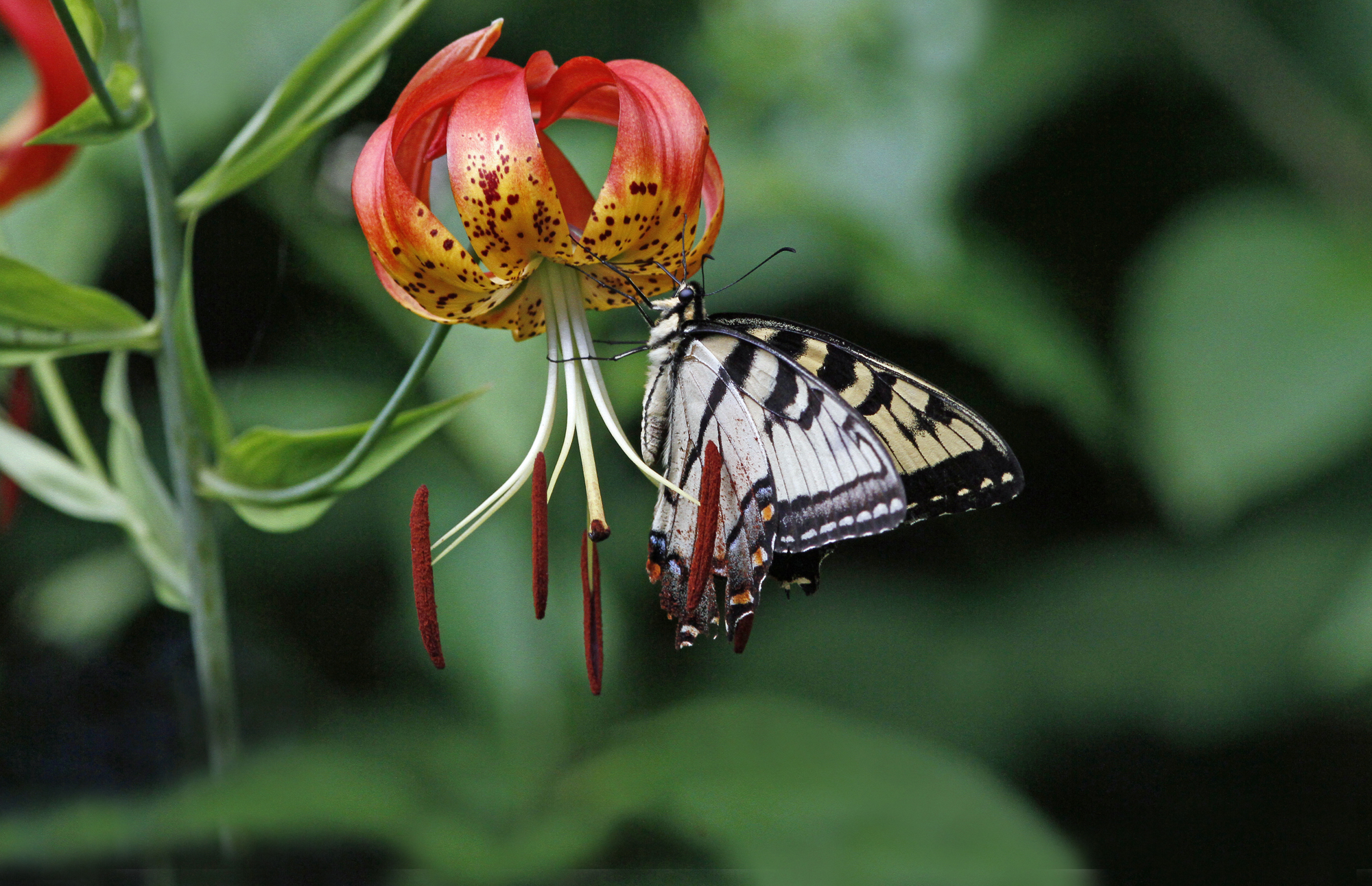
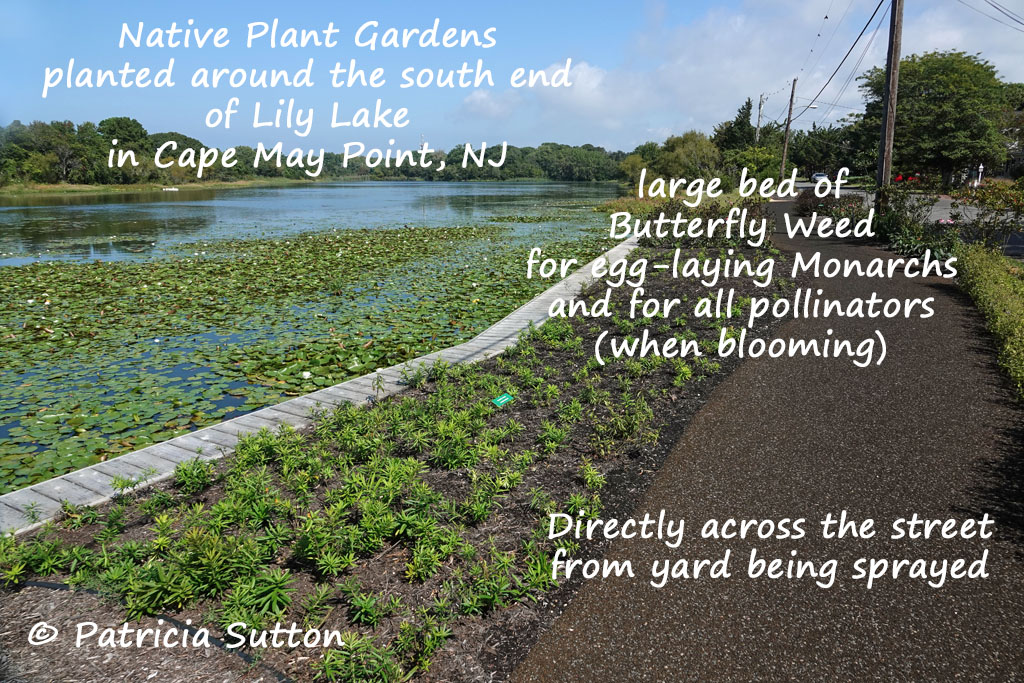
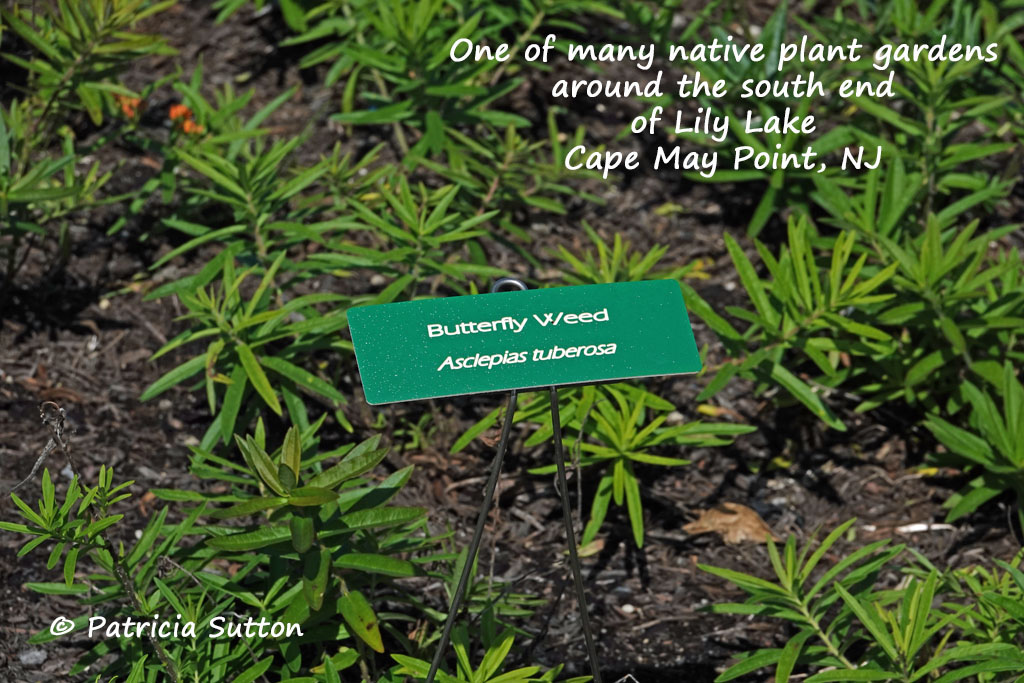
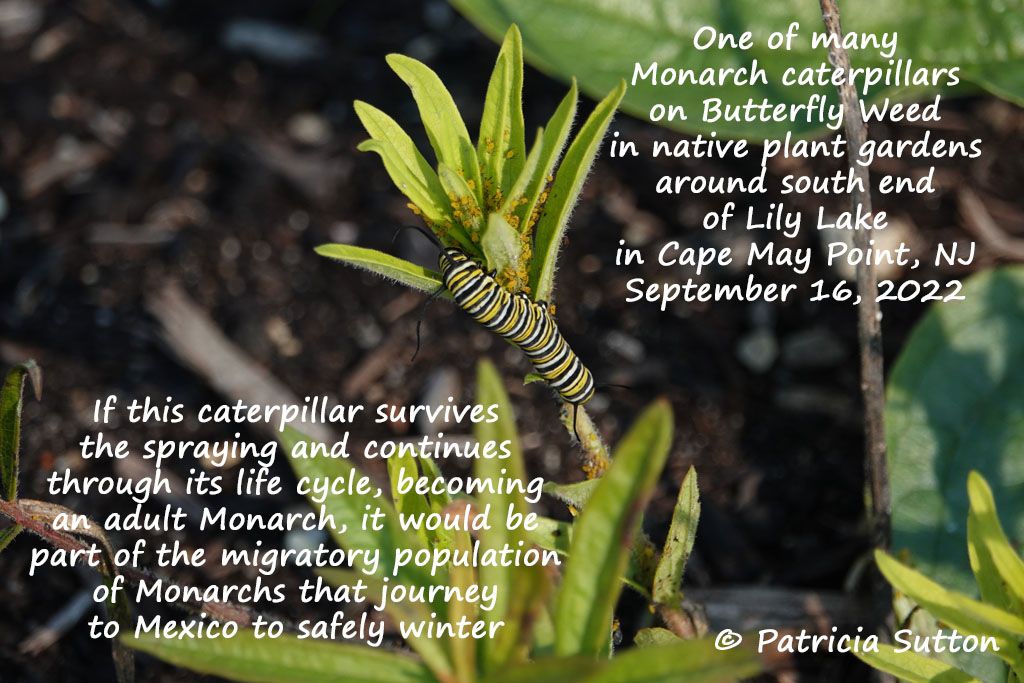
Hi Pat,
Thank you very much for your email.
Properties in Ocean City are commercially sprayed with insecticides, along with sprayed petrochemical solvent mixtures of herbicides.
Since the EPA has for decades permitted hundreds of these pesticides, with the NJDEP allowing the EPA’s permitted pesticides, then our municipality has taken the position to use and allow all permitted pesticides.
I have been wondering how to initiate NJ protective legislation regulating pesticides use (herbicides, insecticides, fungicides) on inland and coastal watershed lands, which drain into fresh water ponds and lakes and into salt marsh wetlands, and marine waters. I am aware that the recent SCOTUS weakening of the Clean Water Act’s protection of wetlands may have unfortunately made protective legislation even more difficult.
Some environmental groups have used “rights of nature” to advocate for protective legislation. Could this approach be used to protect pollinators and birds in pollinator gardens and rewilded areas?
My years of attempts to decrease island wide pesticides applications in OC have not been successful. I am thinking that my efforts need to be directed toward NJ protective legislation. Of course this seems insurmountable, but I think it is time to collectively proceed in this direction, maybe with “rights of nature” inclusive of inland, salt marsh wetlands, and coastal ecosystems, all of the species within these life systems, and then also “rights of aquatic life” to be protected from pesticides contaminated runoff.
Hello! Thank you for this important article. I live in PA and have gone through the whole process of reporting illegal drift, which my husband calls invisible poisonous graffiti.
I couldn’t figure out why, in my backyard native pollinator garden, I had no aphids on my milkweed, no caterpillars, and not even bees or pollinators on my mountain mint.
One early August day I was late going to work and was hit hard with a very strong garlic smell coming out my front door. I saw the commercial mosquito spraying truck parked in front of a house on the street literally above my property and saw the cloud of mosquito fogging going straight up in the air. I was livid.
First, I approached the applicator who gave me the “it’s harmless garlic and just because I can smell it doesn’t mean it’s getting on my yard” speech. I called the company and told them they were spraying negligently and my pollinator garden was proof. I then called my municipality and the neighboring one to report it and they both gave me no information other than they can’t do anything.
Finally, I called our PA DEP who referred me to the Departed of Agriculture and I reported. They are understaffed so they couldn’t come out and sample for 10 days and told me it would be a long time until I got the results. They were right. As this company was allowed to spray monthly/every other week, I had to just allow it.
In December, a week before Christmas, I received the results that the bifenthrins, a pyrethroid, were detected on my property. I was devastated. I was told they would either get a warning letter or fine. Turns out, I was the 5th reported case for this particular company and they had to pay a $3600 fine. They appealed, saying there’s no way it got that far. We had a hearing scheduled for May and the Department of Ag had a lawyer for my case. Because I don’t spray and no other neighbors used that particular pesticide, plus I had a video of the applicator spraying straight up in the air, 2 weeks before the hearing they admitted fault and paid the fine. Their fogging had to cross two other properties to get to mine. That means it drifted to at least 3 additional properties and possible more. Infuriating is an understatement. None of this cost me a cent but it is devastating that my little pollinator garden, my source of solace, has been taken from me.
Unfortunately, they are still allowed to keep spraying. The same company was out the first week in May and has been coming every two weeks since. I have already reported them again.
I am also now on the Pesticide Hypersensitivity through the Department of Ag list so once it’s published I will need to be notified. I originally got on due to the extreme anxiety I have because of it and now I am having allergic reactions because of it.
We have to band together and build awareness and report, report, report! They can’t get away with this! They are robbing us all of our entire ecosystem.
Julie, thank you SO MUCH for sharing in depth what you have gone through in Pennsylvania. May it give others the encouragement they need to speak up and be heard. I’m aghast that the “Company” is at it again in your neighborhood. Maybe it is time to bring in a reporter to get this story in print and widely heard. Maybe contact the Xerces Society, especially if they have staff in your area / state. Kelly Gill is active here in NJ; her e-mail is: kelly.gill@xerces.org. Scott Black is the President of the Xerces Society: sblack@xerces.org. They may have some advice.
Dear Pat,
Thanks so much for this article which I found in my time of need. I have spent the last ten years creating a pollinator and bird friendly garden, in addition to an organic vegetable garden, on my property in Ocean City. I have an oversized lot and an undersized house so it has become an oasis for living things in this over-developed town.
I was absolutely aghast when I realized my neighbor was having “mosquito” control done on their property which shares a common boundary with mine. I initially couldn’t fathom what was happening when I heard a loud blower operating followed by a fine mist landing on me and my gardens. Turns out the commercial company Ehrlick Pest Control was aerial spraying One Guard, active ingredient – bifenthrin. When I confronted the applicator, he politely assured me it was perfectly safe. I explained my investment of time and effort to create a pristine, clean, organic environment. I told him I didn’t want any trace of his chemicals to reach my property and he said he would make note of my concerns. Not the solution I needed.
I have been hesitating for several weeks now to confront my traditional and environmentally uncaring neighbor but I knew I had to do it. Thankfully I looked on your website for inspiration and found this article. When I read your statement “If we (individuals and communities) create pollinator habitats with plantings of native plants, it is our obligation and responsibility to also protect them from incidents like this. Otherwise all we have accomplished is to have created ecological traps where we are dooming the very pollinators we are trying to benefit by concentrating them in potentially hazardous sites.” – I was moved to action!
I’d like to report that my neighbors have completely seen the light and agreed to stop spraying but no, I was sadly not that persuasive. However, I have got them to instruct Erlich not to use an aerial sprayer/fogger, and to only apply the poison directly to the ground on their property with no overspray to mine. They have also agreed to notify me in advance of any spraying. In addition I am pursuing a case with DEP in connection with the aerial spraying that did occur and challenging the use of bifenthrin, because is not supposed to be used anywhere near water due to its toxicity to fish.
Thanks for your continuous support, guidance and inspiration,
Nancy
Nancy, Thank you so much for sharing your experience and for speaking up on behalf of the pollinators and other life you’ve drawn to and benefitted with your gardens and habitat!